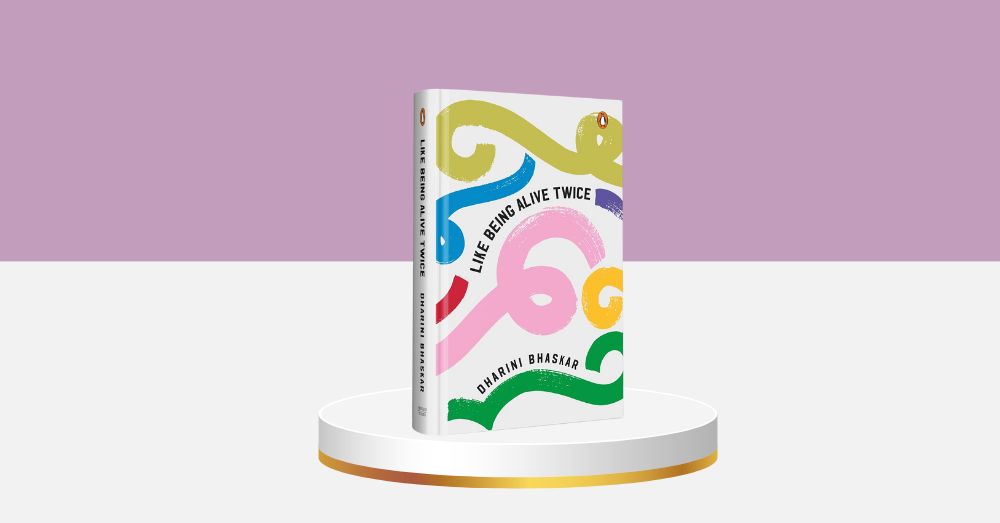Like Being Alive Twice by Dharini Bhaskar
Genre: Dystopian, Literary Fiction
Rating: 5/5
One Line Review: A masterful comingling of love and dystopia. Like Being Alive Twice is an emotionally charged and unforgettable narrative experience.
“So maybe . . . maybe if we must remain uncertain, if no matter what we choose we hesitate . . . Maybe we should risk happiness.”
Dharini Bhaskar’s Like Being Alive Twice is a striking exploration of love and its endurance in the face of a dystopian world on the brink of rupture. Set in an unnamed nation, the novel introduces us to Priyamvada (Poppy) and Tariq (Tar), a Hindu-Muslim couple whose love story unfolds against a politically charged backdrop.
The novel’s standout feature is its remarkable structure, crafted in a delightfully creative narrative with alternating chapters. We experience the events through the tale as-it-was and the tale as-it-could-have-been-if-only, creating a fascinating tapestry of fact and possibility.
Bhaskar’s storytelling is emotionally charged, urgent, and vividly visceral, delving masterfully into the intricacies of love, loss, and the language of privilege. The seamless integration of poetic gems from stalwarts like Jack Gilbert and Linda Gregg throughout the narrative adds an almost ethereal quality to the prose, infusing it with a spirit too alive to capture into words. Like this one:
“It is clear why love
took me to the shore of death,
but why did it bring me back?”
or this:
“The soul must be experienced to be achieved.
If you love me as much as you say you
love me, stay.”
The short bursts of staccato sentences, combined with the lilting conversations between love, dreams, and desires pitted against a world unwilling to bend, create a sense of instant earnestness that kept me enthralled throughout the book.
The title of this book itself is drawn from Linda Gregg’s collection Too Bright to See which Gregg dedicates to Jack Gilbert—a fellow poet with whom she had an intense eight-year partnership—with the words, ‘It Was Like Being Alive Twice’. It is so very apt for the story’s unfolding in two timelines—one real and one in the realm of possibility.
The dystopian setting of the novel is both brutal and deliberately resonant with the contemporary socio-political climate. The introduction of ‘Tally Cards’ determining an individual’s worth based on gender, religion, ideology, and marriage choices adds a layer of societal scrutiny that feels uncomfortably close to reality.
The characters, especially Poppy and Tar, come alive with conviction and complexity. The relationship dynamics between the four central characters—Poppy, Tar, Yuvi, and Yana—are organic, surreal, and deeply poignant.
Poppy’s relationship with her mother steals the show for me and how! Through this dynamic, the author skilfully showcases how behaviours and histories repeat themselves, and how, despite the best of intentions and/or privileges (or the lack thereof), we live our own highly unique lives, making our own mistakes and decisions.
The love between Poppy and Tar is a vivid, tangible force that hooks the reader from the beginning and doesn’t let go until the very end. Bhaskar’s portrayal of this relationship adds a deeply emotional and human element to the broader dystopian themes.
The only hiccup in this otherwise flawless storytelling is the initial difficulty in getting into the narrative. The book starts off in the fashion of most Sci-fi books with absolutely no world building and assumes a sort of ‘lived-in’ reality. The world and its rules, the dystopian nature of this world, is revealed slowly, like peeling the layers of an onion.
While this technique may pose an initial challenge for some readers, it ultimately proves to be a brilliant storytelling choice. The book picks up momentum rapidly, becoming a whirlwind of a narrative that is both interesting and impossible to forget.
There are many nuggets of pure literary genius contained within this masterpiece; here are a few I absolutely loved:
“In any close association, one person watches. The other steers.”
“Perhaps this too—this especially—was love. Not the shared meals and the getaways and the body craving the body. But this. Two people in a room. Scared. Carrying on.”
“To live, we were both aware, was to gather secrets. And to protect them.”
I would strongly recommend Like Being Alive Twice to readers who enjoy fast-paced dystopian literature, as well as those who appreciate poignant literary fiction. With its universal themes and unique narrative voice, the book stands out in the Indian literary space as a brilliant jewel.
Dharini Bhaskar’s exploration of a love story amidst political turmoil is a thought-provoking and emotionally resonant addition to contemporary literature.
Like Being Alive Twice defies genres and societal expectations alike, and will linger in my being for a long, long time—a constant reminder of the courage inherent in loving another and embracing one’s true self.
I will remember this book for Poppy and Tar and how “They slipped briskly into an intimacy from which they never recovered.”
(Quoted in the book from This Side of Paradise by F. Scott Fitzgerald)
This book has been published by Penguin Viking
#YKAReads #bookreview
